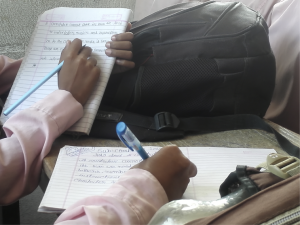You are here
- Home
- Research highlights risks of English-only teaching and learning
Research highlights risks of English-only teaching and learning
28 November 2017

New research in Ghana and India highlights how children's learning can be damaged when pupils are taught in an unfamiliar language. A report on the research encourages education policymakers and practitioners worldwide to avoid using only English in primary school classrooms where pupils struggle to understand it. The report sets out how pupils learn better in English medium contexts when they can also use their home languages, and how teachers around the world can be more flexible in using languages for learning.
The report (Multilingual classrooms: opportunities and challenges for English medium instruction in low and middle income contexts) is underpinned by research undertaken by The Open University, in partnership with the British Council and Educational Development Trust. The research looked at how English as the medium of instruction currently operates in low and middle income countries (LMIC), and how the policies of governments and schools translate into practice in the classroom. The report has been made available to provide insight and support to those responsible for setting policy and teaching according to policy in complex language environments across the world.
The Open University team carried out field work in primary schools in Ghana and India – two highly multilingual countries where English is often the medium of instruction - and says:
“Great emphasis is placed on English by governments around the world as a language that can build young people’s intellectual and economic capital – giving them greater opportunity in an increasingly global world. Yet we know that there are many challenges to using English as the language of instruction in the classroom, and these can have a significant impact on the development of learning where students are not sufficiently competent in the English language to be able to understand the subjects that they are being taught. We have made a number of observations and recommendations in our report which can be drawn on by education policymakers and practitioners around the world.”
To download and read the report, click here.
The research was carried out by an Open University team which specialises in primary education and teaching in LMICs, notably in Africa and Asia. It was conceptualised and funded by the British Council and Education Development Trust. The British Council trains and deploys English language teachers across the world. Education Development Trust is a not-for-profit organisation that works with governments in many countries to improve educational outcomes for children.
A series of blog posts has been written by members of the research team focusing in more detail at different aspects of the research, its outcomes and implementation. The first in the series ‘How can children in low- and middle-income contexts learn more easily when English is the medium of instruction?’ can be found here. In subsequent blogs, Open University researchers set out latest evidence from around world, with particular findings in Ghana and India. The Education Development Trust details implications for policymakers and practitioners, and the British Council sets out its thinking on the future of English in the classroom. These blogs will be published weekly on the The Open University’s International Development research site and shared on the OU’s International Development Twitter feed.
We want to start a conversation about how best to use language (s) in the classroom in EMI contexts and look forward to you joining this conversation and contributing to this important debate. You can either do this on Twitter using the hashtag #EMIclassrooms or email us at ID-OU@open.ac.uk.
Photo by Dr Lina Adinolfi. Photo is not to be used without seeking permission from Dr Adinolfi.
| Attachment | Size |
|---|---|
| 2.01 MB |
Share this page:
Monthly Archive
- March 2024 (1)
- November 2023 (1)
- February 2023 (1)
- January 2023 (1)
- November 2022 (1)
- October 2022 (1)
Contact us
To find out more about our work, or to discuss a potential project, please contact:
International Development Research Office
Faculty of Arts and Social Sciences
The Open University
Walton Hall
Milton Keynes
MK7 6AA
United Kingdom
T: +44 (0)1908 858502
E: international-development-research@open.ac.uk
.jpg)